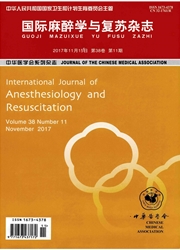

 中文摘要:
中文摘要:
巨噬细胞移动抑制因子(macrophage migration inhibitory factor,MIF)是一种主要的前炎因子,在脓毒症、急性呼吸窘迫综合征等炎症性疾病的发生发展中起着重要的作用。Bozza等研究观察到,外科大手术后机体血浆中MIF的水平与脓毒症的发生、预后密切相关。
 英文摘要:
英文摘要:
Objective MIF, a potent pro -inflanmkatory cytokine, plays a pivatol role in the pathogenesis of sepsis. A novel CATT microsatellite at position -794 of the human MIF gene functionally 'affects the activity of the MIF promoter and correlates with the disease severity in rheumatoid arthritis, ulcerative colitis, atopy or sarcoidosis. The purpose of this study is to determine whether MIF microsatellite is associated with the susceptibility to and outcome of severe sepsis. Methods After approval by the hospital and national ethics committee, written informed consent was obtained from the patient or a first degree relative. Blood samples were obtained from 98 postoperative patients with severe sepsis (sepsis group) and 73 controls. Microsatellite was determined using polymerase chain reaction (PCR) with a FAM -labeled upstream primer combining capillary electrophoresis. Statistical analysis was done by Fisher' s exact test. P 〈 0.05 was regarded as statistically significant. Results Tbe underlying diseases for the severe sepsis patients were peritonitis, pancreatitis, pneumonia and multiple trauma. The APACH II score in sepsis was 22.5 ±2. 1, the mortality in sepsis patients reached 51%. There is no significant difference in the race, age, sexual. Four kinds of alleles with 4, 5, 6, or 7 - CATT repeat units and seven kinds of genotypes with 4/4,4/5,4/6,4/7,5/5,5/ 6,6/6 CATT repeat units were detected among these patients either with or without sepsis. The genotype distribution and allele frequencies between sepsis individuals and controls, between smvivors and non - survivors didn' t differ (P 〉 0.05). Conclusion This study shows that the functional CATTn microsatellite in the promoter of macrophage migration inhibitory factor is neither related to the incidence of severe sepsis nor to the fatal outcome of sepsis.
 同期刊论文项目
同期刊论文项目
 同项目期刊论文
同项目期刊论文
 期刊信息
期刊信息
